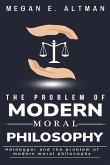In modern society, can people viably be generalists, who translate information, methods, and techniques from external disciplines to improve their own? This thesis considers arguments from writers in the tradition of social theory like Smith, Hegel, and Durkheim, which claim that professional specialisation is an inherent feature of modern society because of its productivity and its role in socially integrating and developing the personality of individuals. This makes generalist positions appear unviable. Against this, the thesis highlights several issues with specialisation and the arguments supporting it, most notably overspecialisation, which presents specialisation as sometimes harmful to the factors it supposedly benefits, such as productivity, personality, and social integration. A taxonomy of different modes of work is then presented, to analyse potential alternative ways for work to function in modern society. This leads to the presentation of a model of generalism which translates methods and knowledge from one specialisation into another. It is compared to other modes of work and its benefits are highlighted. The thesis concludes with recommendations for how to make this kind of generalism useful within modern society and broaches the normative implications of doing so








